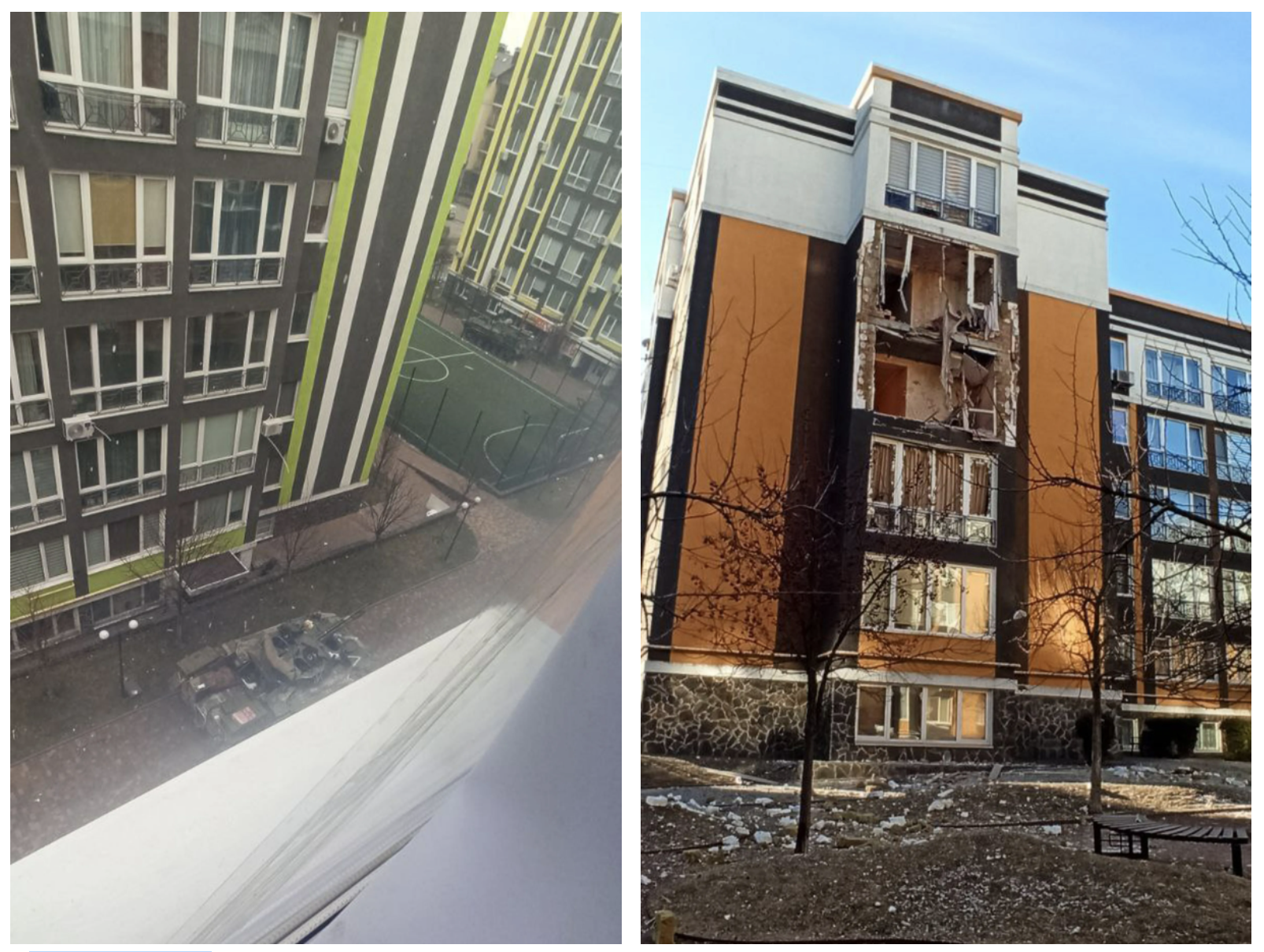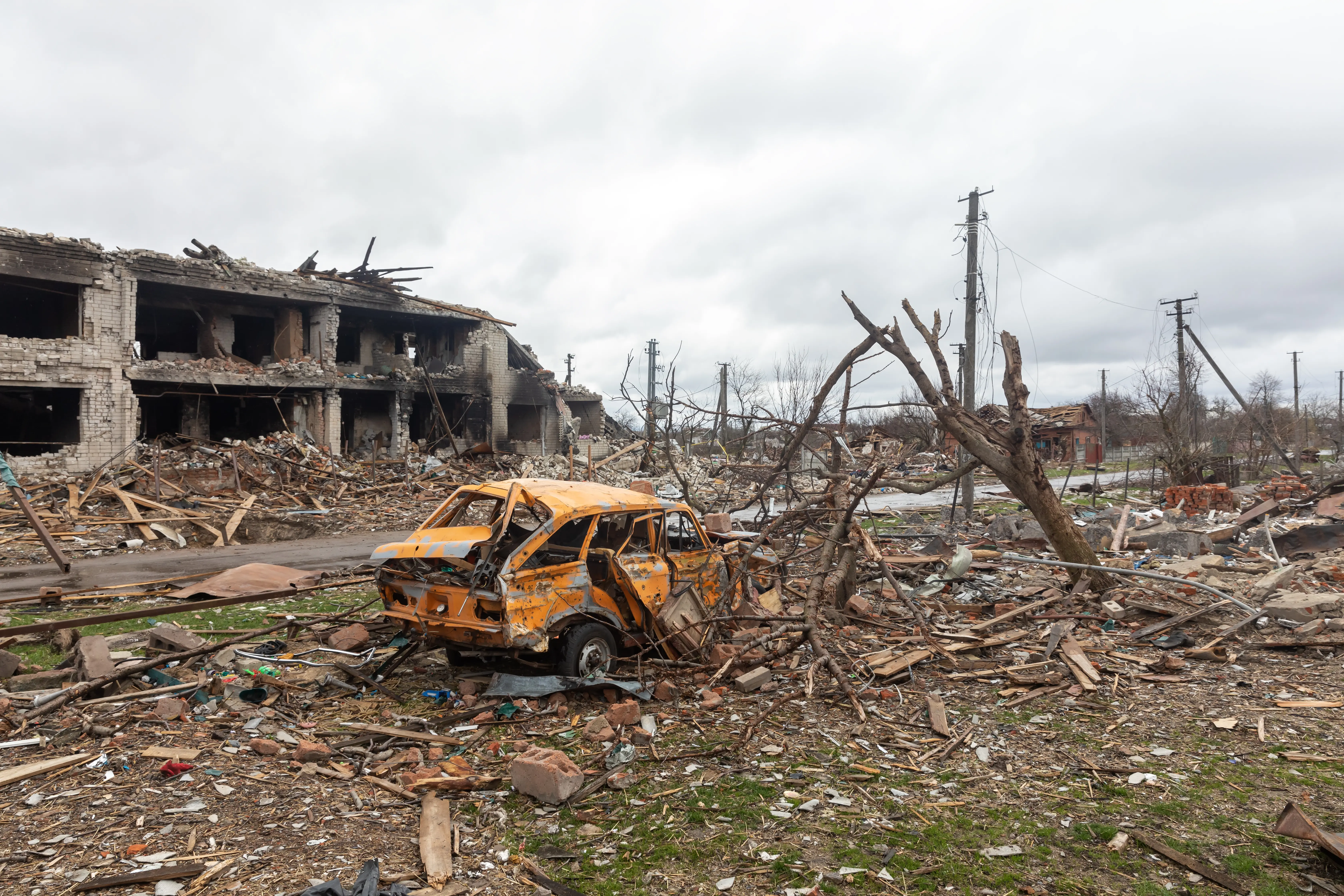
The Chernihiv region of Ukraine was attacked by Russian troops on the first day of the war. Fighting for Chernihiv lasted more than a month, and the Russian soldiers' route to the capital passed through small settlements. IStories spoke with the residents of villages in the Chernihiv region. They witnessed the killing of civilians, survived torture in a basement, and lost their homes.
"Sometimes drunken Buryats would come and demand women."
The war found Yulia, a resident of Chernihiv, in the village of Yagodnoye, together with elderly parents and her children — a 9-year-old son and an 11-year-old daughter. Russian soldiers kept the family in the basement together with other villagers for a month
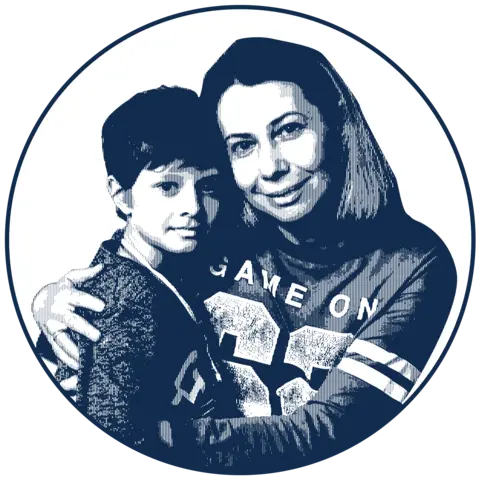
As a nonprofit journalism organization, we depend on your support to fund coverage of global conflicts. Help us continue funding the hard costs of in-depth coverage of the Ukraine invasion—including travel, hostile environment safety training, and the increased security expenses that arise from reporting in war zones.
The Russian troops came to us in Yagodnoye on March 3. At that time, my family and I were hiding in the cellar. We heard them burst into our house, heard the windows breaking — they started smashing everything in sight. Then they started kicking in the cellar doors, shouting, "Is anybody there?" We were silent. Then they added: "We'll throw a grenade." And the kids started crying. My dad shouted to them: "There are peaceful people here, don't shoot. There are children here, don't scare them with guns." They came to us in the cellar — there were both [ethnic] Russians and slant-eyed Buryats [Buryat — northernmost of the major Mongol peoples, they comprise one of the two largest Indigenous groups in Siberia]. My child immediately jumped up, put his hands in the air, and started screaming, "Don't shoot!"
The Russian soldiers started saying: "We came to liberate you, to overthrow your clown." They said that Nazis and Banderites were here. They immediately took away all our phones. My husband had two, he gave one of them, and I gave my child's phone as if it was mine. We told them the children didn't have any phones. We also had a bedridden grandmother, we said she had no phone. They called my dad — they always addressed him as "batya" [pops] — to open the gate. We heard how APCs started driving into the yard, heard how they [the military] were running around in the attic, laughing and shooting. They also asked: "Do you have vodka?"
It was scary at night: we were afraid they would come into the cellar, and go after us, women. But, thank God, they didn't. On the second day, they came down, took my husband and brother. They put them on the floor, undressed them, held an assault rifle to their foreheads, hit them on the back, interrogated them and tried to get a confession that our village was a military town. We answered: "What kind of a military town? It's just an ordinary village."
They didn't even understand: "How is this a village? If there are roads, if there is electricity, if you have tiles in the yard — it's not a village, it's a town." But there weren't any military towns around these parts. They must have followed old maps: once upon a time, when there was no village, we had some kind of military exercises here.
At first, our men were let go. Then the Buryat came down to us again and started saying: "We've detected that you are using a cell service in the cellar, you're reporting our coordinates." But we had no connection in the cellar, the phones were turned off, we put them in bags with the potatoes. Then they took us all out and lead us to the school. They didn't let us in our house, they didn't let us take anything with us; we only took what we had in the cellar, a blanket and things like that. We had to transport my grandmother in a wheelbarrow.
When we got to the school, there were already a lot of people. You could say the whole village was gathered there, about 400 people. There was a basement below the school, where a gymnasium was once located. We were all sitting there like sardines in a can. Our legs were swollen because we couldn't sit properly. There were 71 kids in the basement. The youngest one was a month and a half. There was a baby next to us, six months old. The children were put on cardboard and blankets on the floor, but all the same, it was damp and the temperature was very high and it was impossible to breathe. The children were sweating, they didn't have enough oxygen and some of them fainted. The air was very heavy: at some point, the elderly people began to soil themselves. Already on the second day in the basement, the elderly started going mad: they were undressing and screaming. Our grandmother, who we dragged in a wheelbarrow, died. I don't remember on which day she passed away. She was 92 years old.
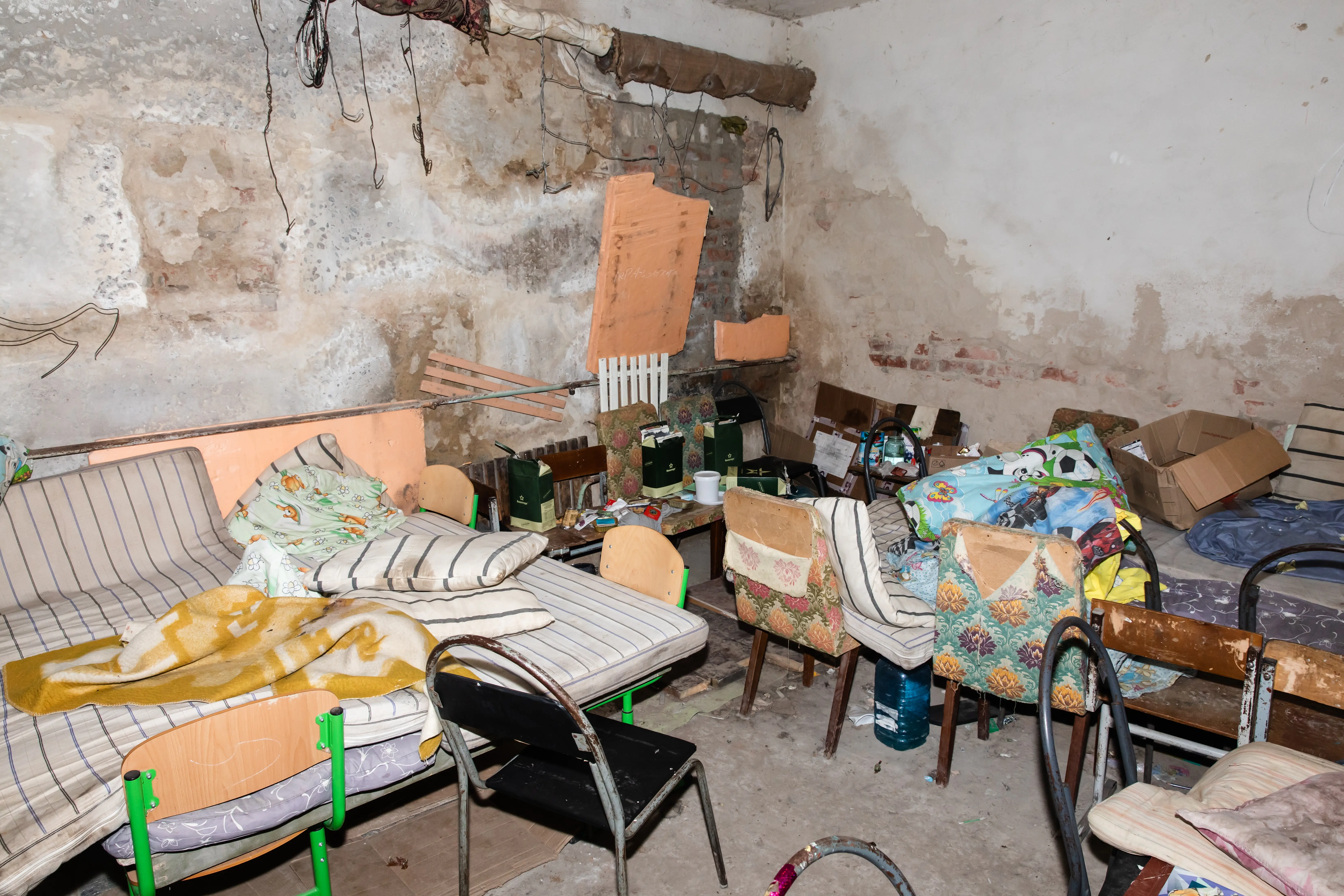
Overall, more than ten elderly people died in the basement in one month. They couldn't bear it — they went mad and died. If people died at night, they would lie with us until morning. We were not allowed to carry them out. We had a furnace room in the school, we took them out there. When there were five dead bodies, we told soldiers: "There are people lying there. Can we go bury them?" They allowed it, but then they started shooting. Apparently, a lot of people came out to bury the deceased, so the Russians started scaring them. Two people got shot in the leg, and a girl got shot in the back. Her grandfather died and she had gone out to bury him. One more boy was wounded, along with one of my classmates.
They were often shooting like that. If they allowed us to take the children to refresh themselves in the outdoors, they would start shooting in the air. And they would say, "Don't be afraid, that's how we are learning." The children all cried and went straight back to the basement. They were making fun of us like that. They used to give us their ration packs with such a smirk — they would throw them to us as if we were dogs, and little children would run up and take them away. They're kids; whatever they are given, they take. And they [the military] recorded it all on video.
If they were in a good mood, they would let us out to go to the toilet at a certain hour. If they opened at eight o'clock, we already knew that by nine o'clock there would be shelling. While we were standing in line, they started shooting. If they were in a bad mood, they wouldn't let us go outside for 24 hours. We used buckets as a toilet, and asked the military: "At least let us take the buckets out." Every once in a while they let us. It was very scary.
Sometimes drunken Buryats came and demanded women. Our people started talking to one of them, asked him where he lived, to distract him a little, and then he sat down and fell asleep. He also gave children guns and grenades. We were afraid one of those grenades would explode, and that would be it.
When we asked for permission to go home at least to get children's clothes, the Russians tied white bands around our arms, but followed us anyway, leading us at the point of a gun. Upon entering the house they would say: "Take it quickly and get out of here." Some people were not even allowed into their own houses. When we came with my mother, we wanted to take our underwear, but there was none, not even shabby ones — they had taken everything. They even took all the children's underwear from some families.
When we first came to the basement, the first thing my daughter did was write the Ukrainian anthem on the wall. We were afraid that the Russian soldiers would come in and read it, so we hung our bags to cover the anthem so they wouldn't see it. They handed out their [Russian] newspapers and told us, "If you want to go home, sing the Russian anthem.' They mocked us all they wanted.
We begged them to fetch water from the well. Those of us who could brought canned food from home, cereals, whatever was left over. We made lenten soup to feed at least children and nursing mothers. My sister-in-law's aunt was such a fighter; I am grateful to her. She wasn't afraid of them. She put on an armband and started pushing forward: she would bring some groats or potatoes from home. She even drove the Buryats out: "Get out of my cellar, I have to go there!" But when my neighbor wanted to go get canned food for his children, they didn't let him. They said: "People are resting there in the cellar." The Russian soldiers lived in our cellars, ate everything, took out potatoes.
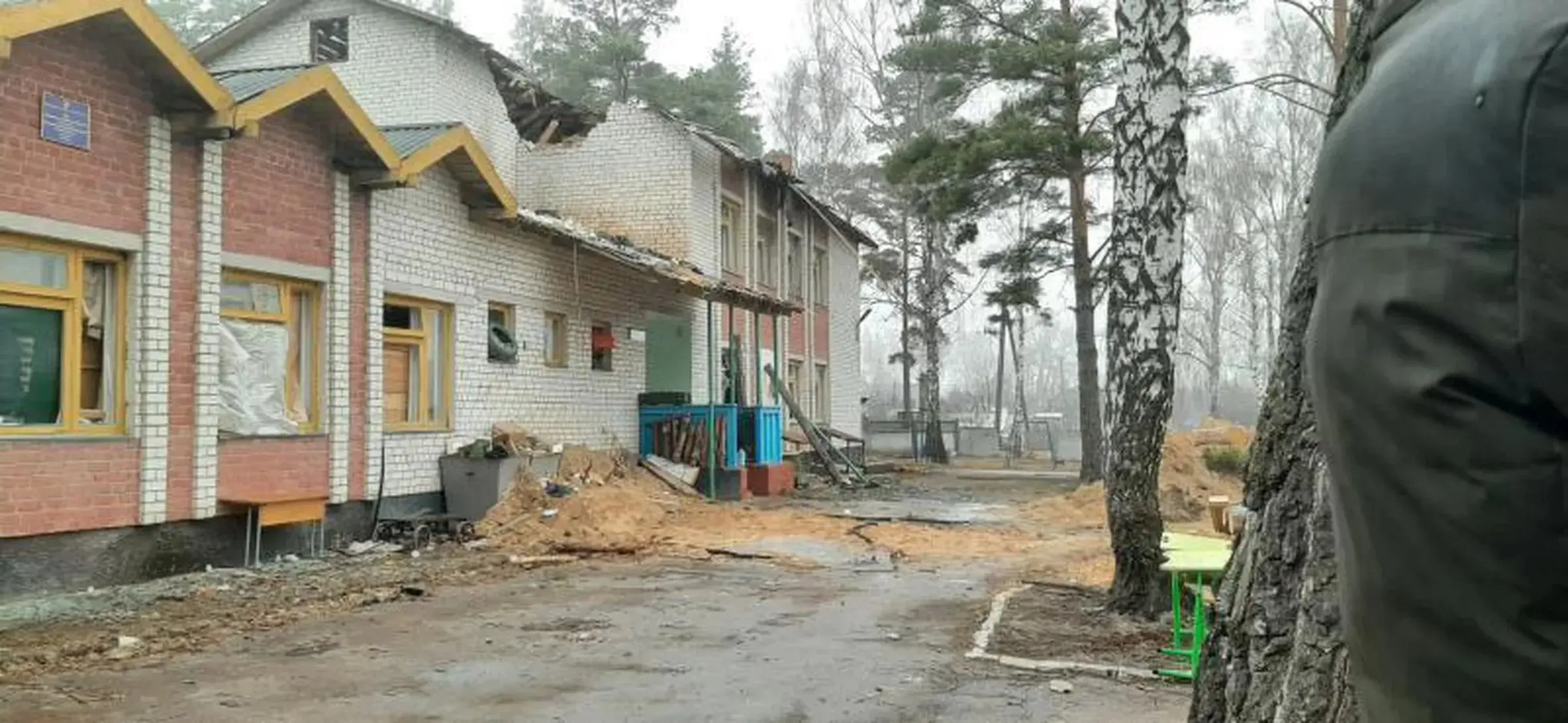
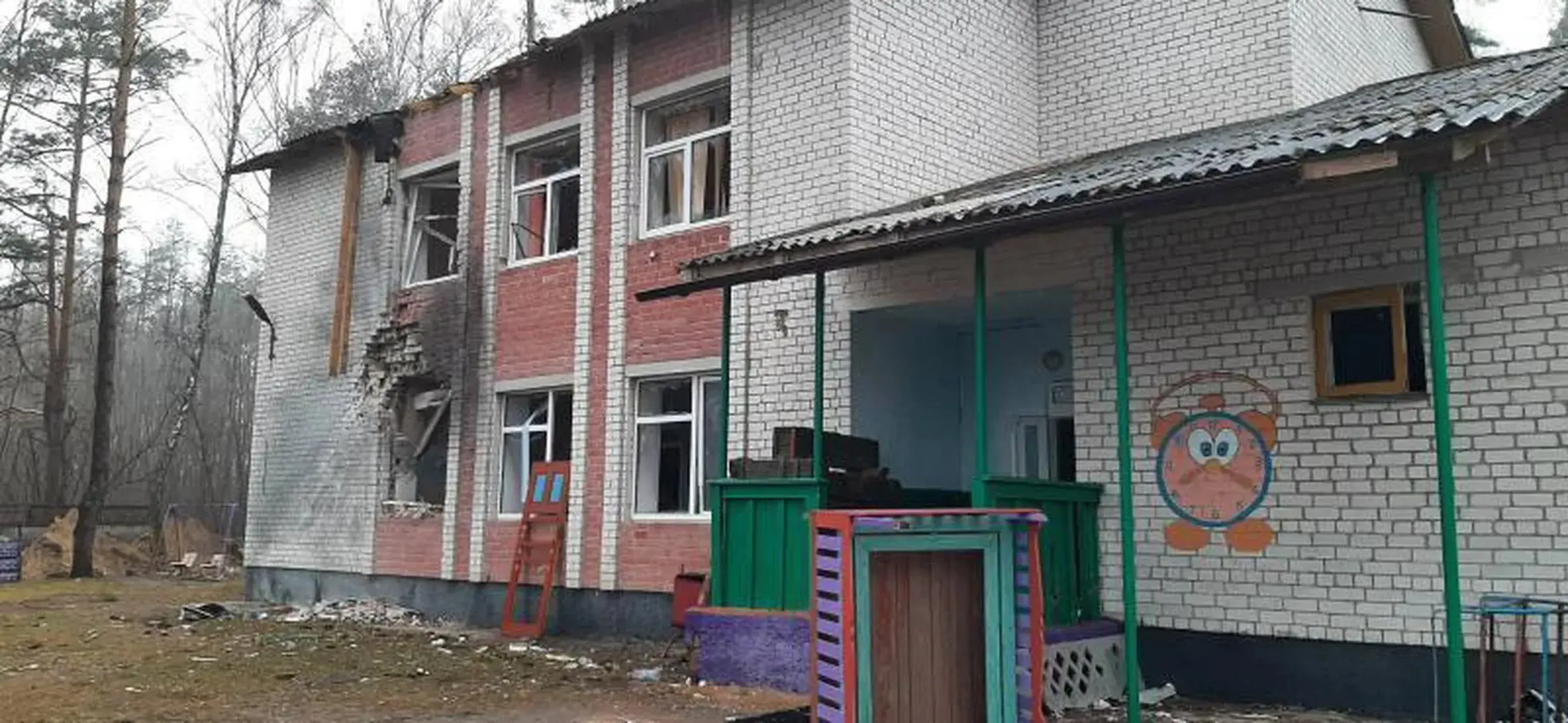
The whole village lived in the basement of the school. Some of them, only the very old ones, like our neighbor, were left in their houses. And another neighbor, from the house across the street, was killed. They say five young men in total were killed in the village. The Russian military was walking around the streets, just shooting at the windows.
Once they made us dig a hole, and we didn't know why. At first, someone said that they would bring a generator so that there would be light, and someone else said: 'We're digging a hole, we'll all be killed, there will be a mass grave." I tried to listen less, prayed, hoped that all this would end and everyone would stay alive. In the basement, I feared the most for the children. My son was so anxious, he was constantly crying and kept saying, "Are you sure we won't get killed? Are you sure we won't get killed?" It was scary, but we prayed, even my children prayed. They lay there and said, "God will save us." They were twitching every night. The children in the basement were sick: they had terrible coughs because it was damp, disgusting, and it was hard to breathe. And we had almost no medicine with us.
They left around March 30. There was heavy shelling that day, and we heard a humming noise. Our men got up, started looking through a crack, and realized they were gone. Then we broke down the door because they had locked us in the basement before leaving. And only then people started going home, calling the hotline to say that everyone was at the school. It was scary the first night because we didn't know if they had all left or if they were going to come back. Our men were on duty that night. I asked my son to go outside at least to get some air. I was trying to persuade him with tears in my eyes. Our military came the next day. Then my son agreed to come out and asked: "Are they really ours?" Only when he saw the flag of Ukraine, he got over his fear.
Then we saw that the Russian military had burned down our house. I'm sure they burned it down because they said to my father: "You live well, father," and he answered: "Well, yes, we lived well, because we worked in the vegetable garden from morning till night." My father built this house by himself, from the first brick all the way through, he put his whole soul into it. There was no house left, no barn, no garden. They had driven their vehicles all over the place, and the garden was completely gutted. All the hard work, everything my parents had been building all their lives, was gone in one second.
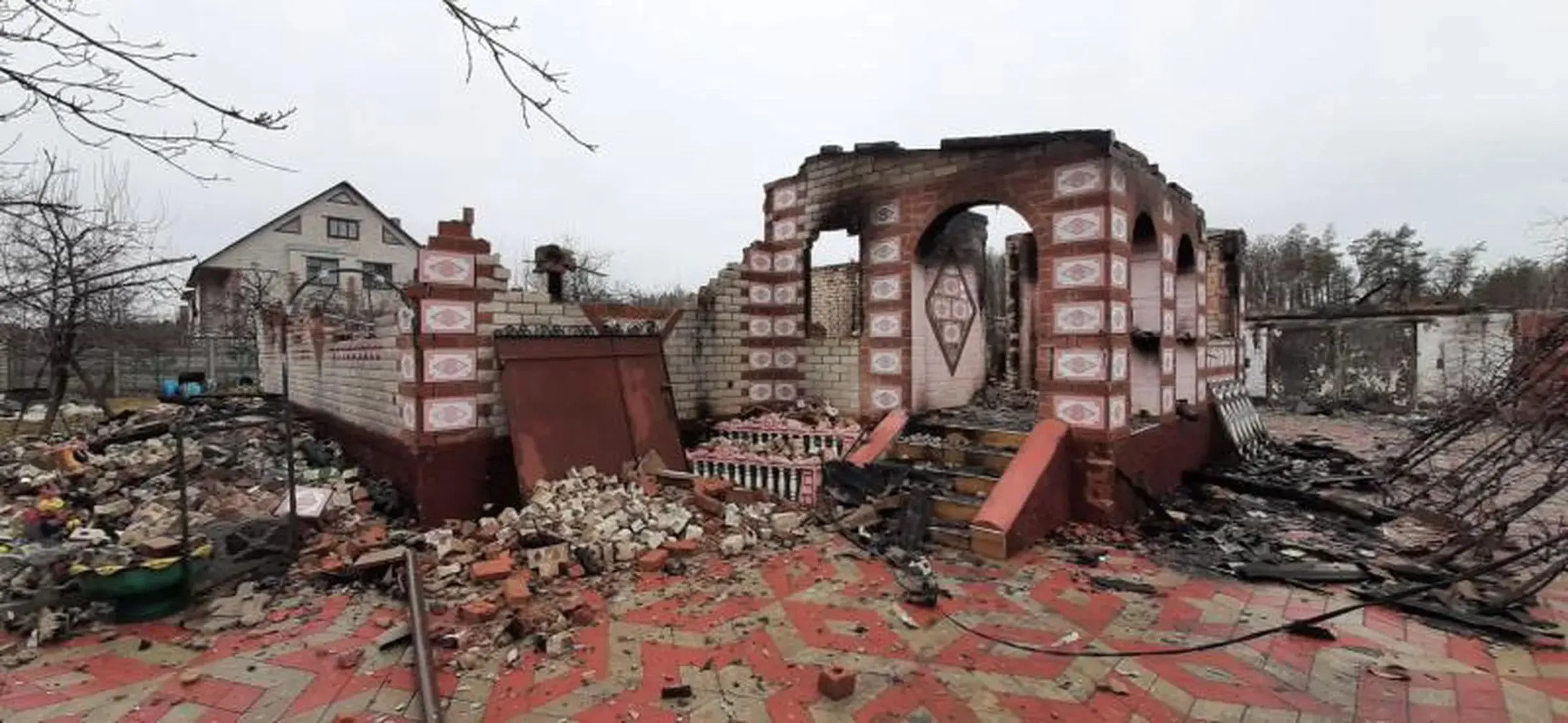
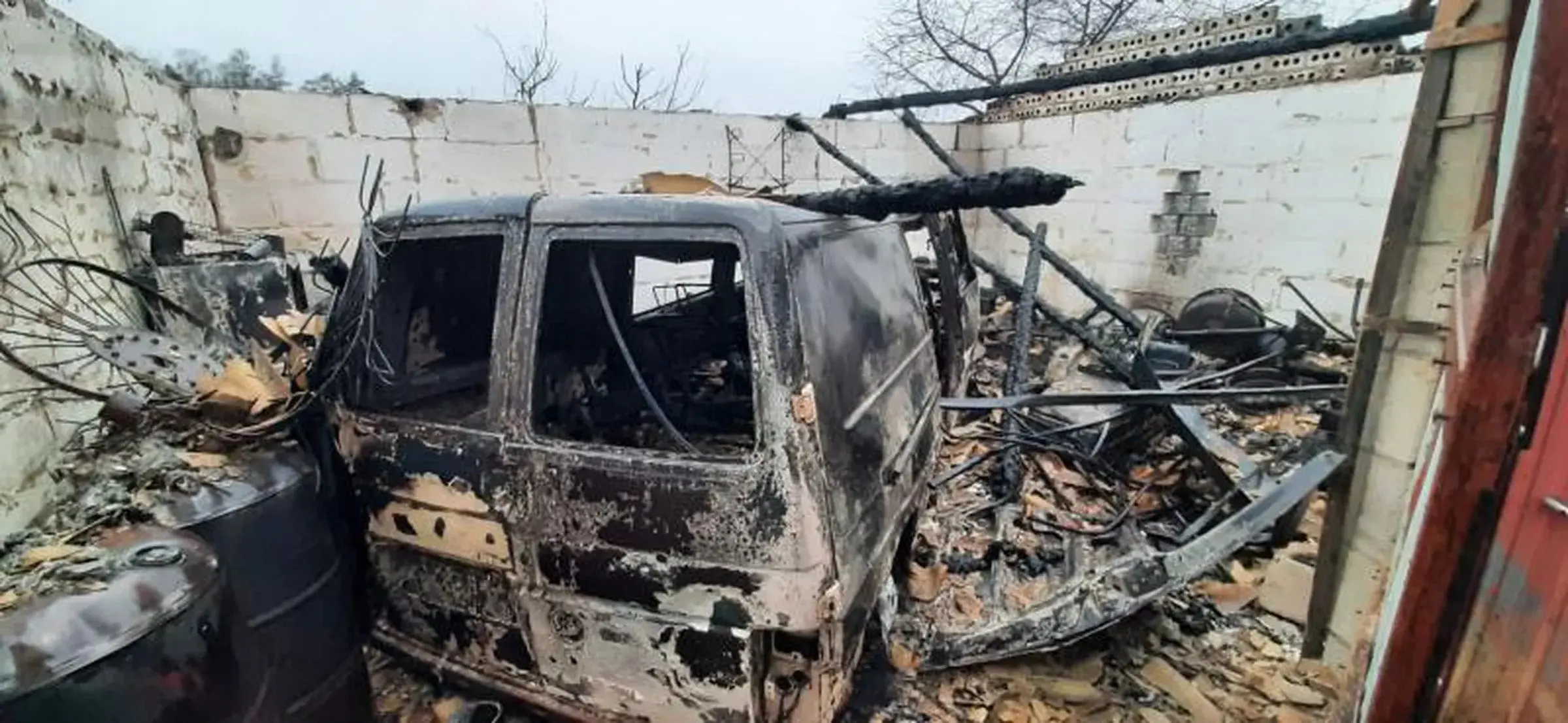
Two cars were burned, mine and my brother's. When we came from the basement of the school to get underwear, I saw that they had broken the cars first. And there was piss and s*** and puke everywhere in the house, everything was mixed with glass, cabinets and sofas were broken. I just don't understand why they did it. Or were they jealous that we were living so well? People had their refrigerators and washing machines stolen, their televisions were taken away.
Before the war, people worked hard. In the village of Yagodnoye, people grew apples and currant, sold strawberries. Our parents grew tree saplings and sold trees. The village flourished and lived; it was young. People worked, lived their life. We are from Chernihiv, we visit our parents every weekend. We didn't even have any thoughts that the Russian military would come. Who would want this small village? But it turns out that they did want it. Someone says that it was convenient for them to stay here — the road to Kyiv is nearby and the junction leading to Chernihiv is also here.
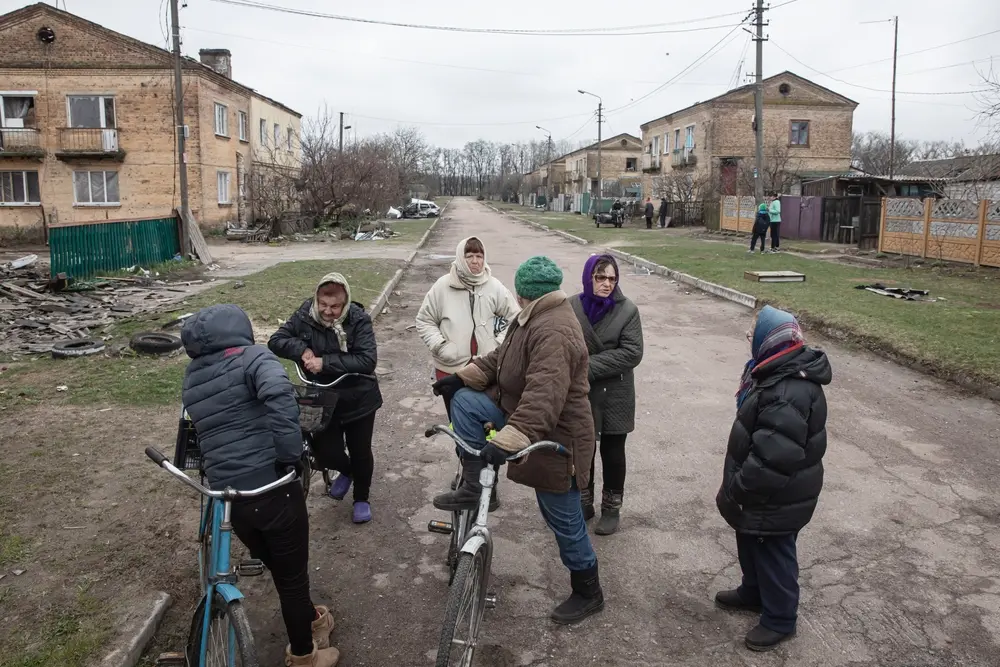
The Russian military told us themselves that they had orders to wipe us out. Before that they said, 'We won't touch you, don't be afraid.' They said that it was our own people shooting at our homes. And we couldn't contradict them because they would immediately point their weapons at us.
It was even strange for them that we had a bathtub and a toilet in our houses. Some soldiers even put a cooking pot in the toilet to do their business in it. They didn't understand how to use a toilet and why it was there in the first place. And it came to them as a shock that there are asphalt roads in the village, that there is electricity here. And they all said that it wasn't a village, it was a town. There is a village called Mykhailo-Kotsiubynske further on. People said that when the Russian military moved in there, they started calling someone in Russia saying, "We have occupied Chernihiv." They had the notion that people couldn't live so well in the village.
But some of the young soldiers, basically children, looking like 17-year-olds, they cried. They told us, "If Ukrainian troops come, we will surrender, we don't want to die. We didn't know where we were going. We don't want to fight, we don't want to kill." And some even confessed: "You speak Russian well too, you are not enemies, there are no Banderites, no Nazis here. People in Russia need to rise up because we don't know how it will end any other way, the leader has to be stopped.
"Locals provided them with moonshine and food."
When the war started, Vitali, a resident of Kyiv, was with his 92-year-old mother in the village of Sofiivka. Near that village, the Russian military shot up a car with a child inside.
For me, it started the same way as it did for everyone else, on the morning of February 24, with the bombing of Kyiv. People realized that the war had started. On February 25, I decided to go to the territorial defense headquarters. I gathered my friends and went there. It was already lunchtime, and there were no weapons left. At that time two Russian APCs broke through. We realized there was nothing to do there; there were no weapons. We decided to go to the village of Sofiivka, where my mother, who is 92 years old, lives. We got there in the evening.
On February 27, we self-organized, and kept watch at checkpoints to keep out looters and saboteurs. At the same time, we received information from the locals that the Russian military convoy had passed on the roads of the Nizhyn district 15-17 kilometers from Sofiivka. Locals called and said that they came in, demanding food and booze. The military started shooting in the air there, and the locals provided them with moonshine and food. They were waiting for reinforcements from Belarus and stayed overnight.
In Sofiivka there was no organization, no instructions from either the military commissar or the leadership. It felt like a small-scale version of 1941, we had no understanding of the situation. The local authorities were there, but we weren't given any instructions. People organized themselves; the young people — some enlisted, some not — everyone was doing something: blocking the roads with trees, so the convoy would not go into the village, would not pass on the road.
On March 1, the convoy went in the direction of Rivchak-Stepanivka, five kilometers from my homeland. They didn't go directly because they had maps from 1984 and took the old roads. At that time our neighbor, my relative Sergei, born in 1989, was on night duty in a self-defense group at a checkpoint. He was informed that a column was coming. He quickly went to Sofiiivka to pick up his relatives, to get them out, because we didn't know where the column was going. There were up to 100 pieces of heavy equipment and tanks. He took his cousin Oksana, the same age, her husband Mikhail and their son Andryusha [short for Andrey] — a 10-year-old boy.
They quickly jumped into the car, and advanced at high speed. They wanted to rush there, to reach our military. And at that time the convoy suddenly appeared between the villages Kolomiitsivka and Kalinivka, there is a kind of crossroads there. Sergei did not have time to get through, and the first tank shot the car. I don't know if they saw that it was a civilian car — they shot them, and the first tank obliquely ran over the car. And the car caught fire. Naturally, they [Sergei and Mikhail] were both killed. Oksana was wounded, she fell out and burned to death outside the car.
And Andryusha was trapped in the back of the car, and he saw it all. He saw his parents burning. The tank ran over the car and drove away, and the second tank stopped. The tank driver jumped out and threw the boy to the side of the road. He waved to him, Andrey says. Then he jumped into the tank, and the convoy went on. Locals who saw everything from afar came running when the column passed. They grabbed the boy. It turned out he hurt his leg, and was severely bruised. They took him to the hospital in Bobrovytsia. The boy became an adult in one moment, we all did, as it happened right in front of his eyes.
Everything was burned, there was nothing left. We called the police, they said: "Take the bodies to the morgue." We explained that there was nothing to take there, everything was burned, only a piece of a spine and a skull were left. At our risk — the next convoy was on its way — we gathered everything that was left in bags and brought them to the parents. We found coffins. A farmer had them somewhere and wanted to bury them in one coffin, but the parents were against that. Everything was rattling, people were even afraid to go out to the street. We quickly dug graves and buried them [Sergei, Mikhail and Oksana] in a mass grave. My mother survived the occupation in 1941 and said: "Germans, fascists didn't do such things."
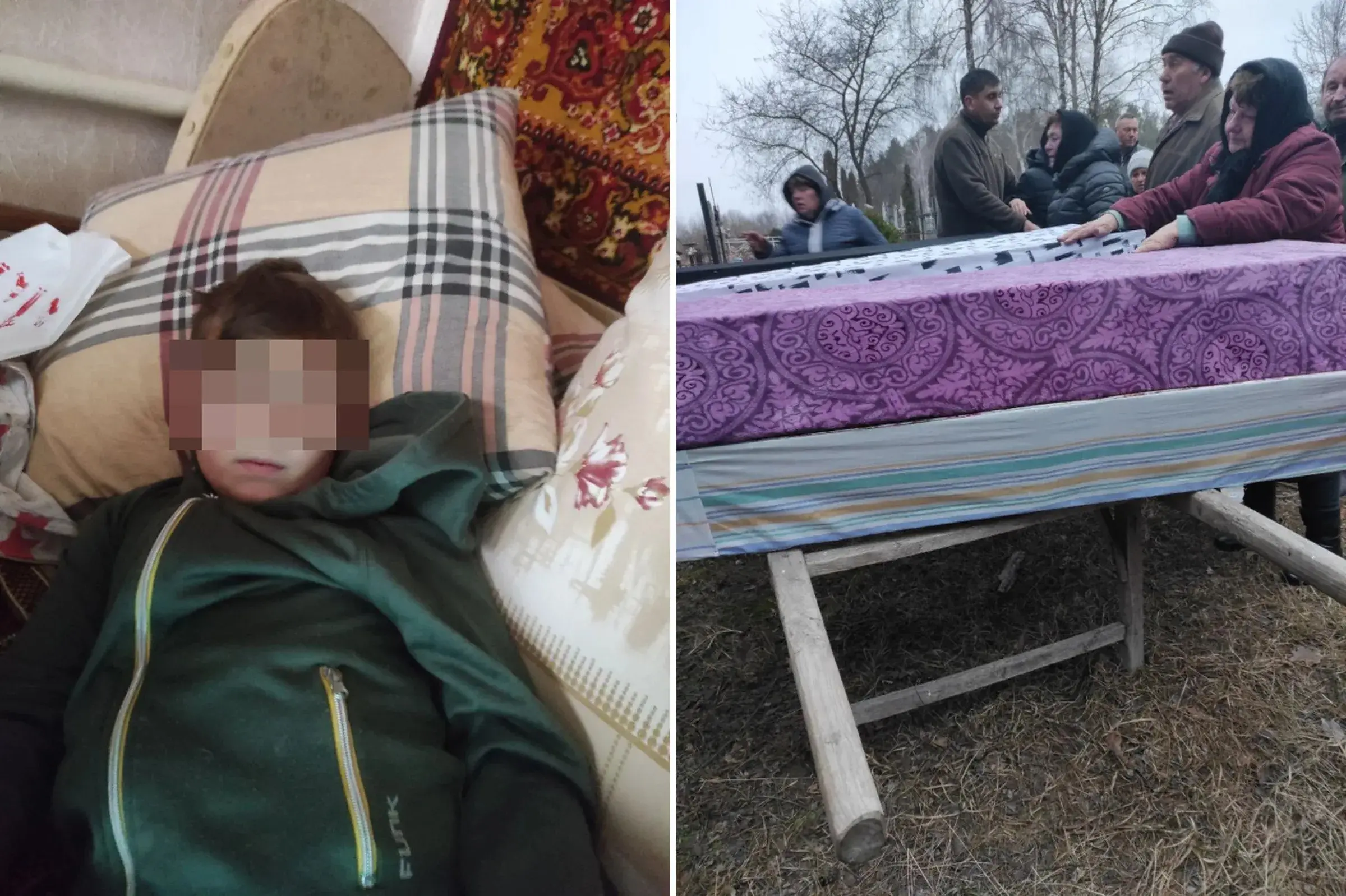
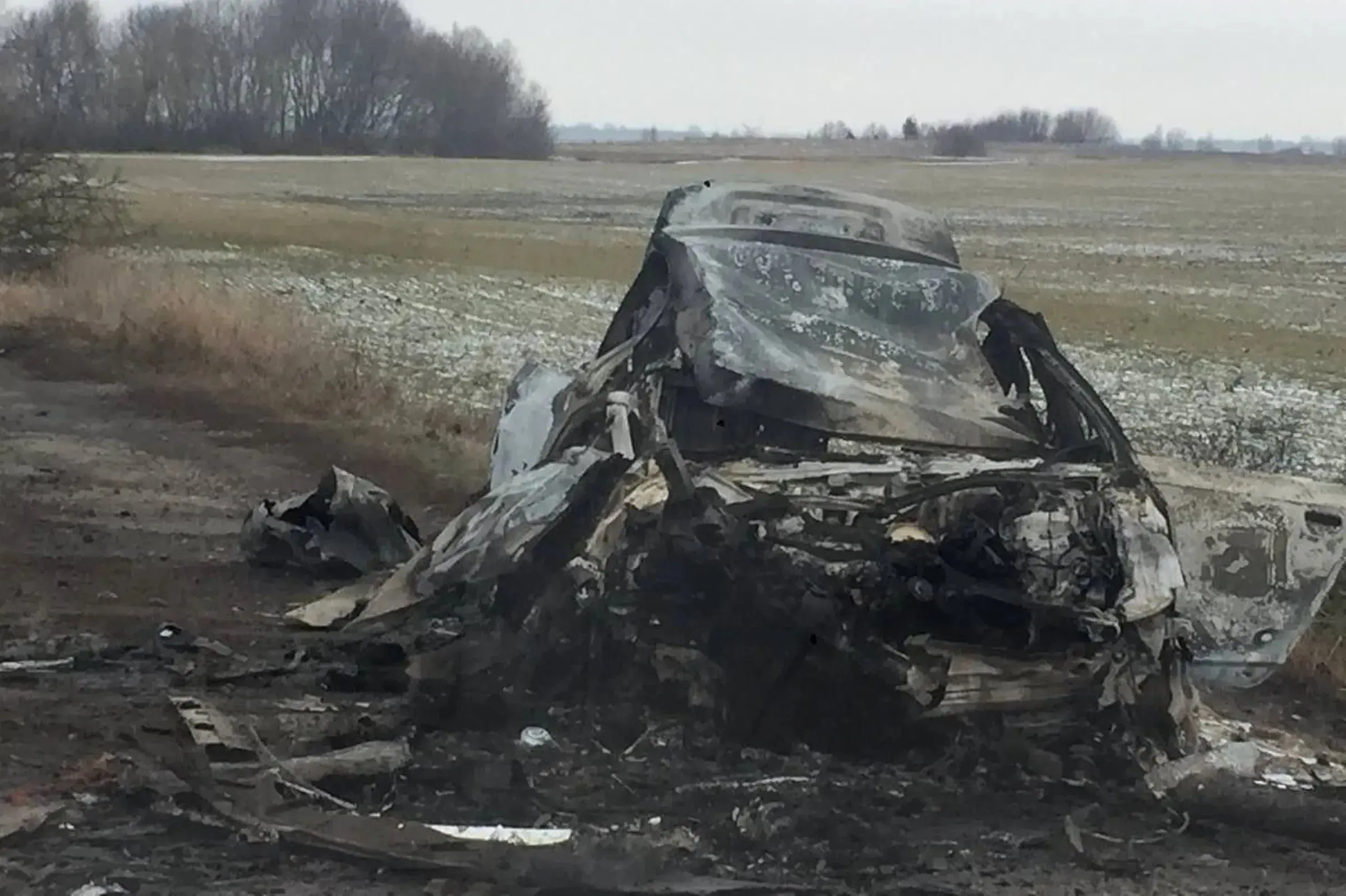
These were the first casualties we had. Then we received an instruction not to provoke because there would be casualties — everyone hid all the weapons. There was no occupation in our village, they were only passing through it. Next to us is Makiivka — they were staying there. They didn't tear the Ukrainian flag off the village council for some reason, they destroyed a few houses but didn't touch people. When the goods were brought to the store to distribute between people, Russian soldiers came there in APCs and seized the store. In Kolomiitsivka village they took everything out of the store, even women's slippers, for some reason they had a craving for women's clothes — I don't know why.
On March 11, they went to Rivchak-Stepanivka, went into the school canteen and stole bags of pasta and groats. On March 12, veterinarian Alexander, 47 years old, drove there in his car, to slaughter pigs to bring meat to people — there were many families with children and dachniki (vacationists) who had no money at all, no bread or anything. Two APCs appeared and shot him with incendiary charges, and the car burned down. In the evening, the locals collected the remains and buried them quickly. People were even afraid to come to the cemetery because the Russian military had hit the cemetery with artillery.
In Makiivka, they drove tanks into the yards of people who opened or removed the gates, put the equipment next to houses, pressed against them, so that our military would not bomb them from drones. As the drones fly, they "see" they can't shoot the equipment so as not to damage houses. As a comrade of mine says, "Now I understand what the Russian proverb means, 'When trouble comes, open the gates."
Then our guys, who were liberating Makiivka, saw an abandoned Russian tank, which was passing through the yard of an abandoned house and fell into a cellar. And they could not drive it out, so they set it on fire. The ammunition detonated, the turret blew off, pieces flew apart, shell boxes flew out, and in one box we found four chicken eggs, still intact. Those were our hens' eggs, the Russians had taken them from local people. It turned out that our eggs were tougher than their tanks.
Medication was found in that tank, and all of it was unsealed for some reason — they must have taken it from people too. In another tank, a carpet was found. On the way out of Makiivka, they stopped in the yard of an elderly man, who is 75 years old: "Grandpa, open up!" The man gave them the fig through the window and didn't open the door. They broke in his cellar and took all the canned goods.
In the village of Tereshkovka, they stood there too — it was a small village, dachniki lived there. Russian soldiers came to an elderly man, introduced themselves, said they were from the Arkhangelsk Region, and "came to liberate" us.
They also said: "Old man, give us some firewood, it's cold." They exchanged cigarettes and dry provision units for firewood. The soldiers saw the man had convectors and said, "What is this, do you have gas in the villages? Wow!" The elderly man told them: "So you came to liberate me and don't know what that is?"
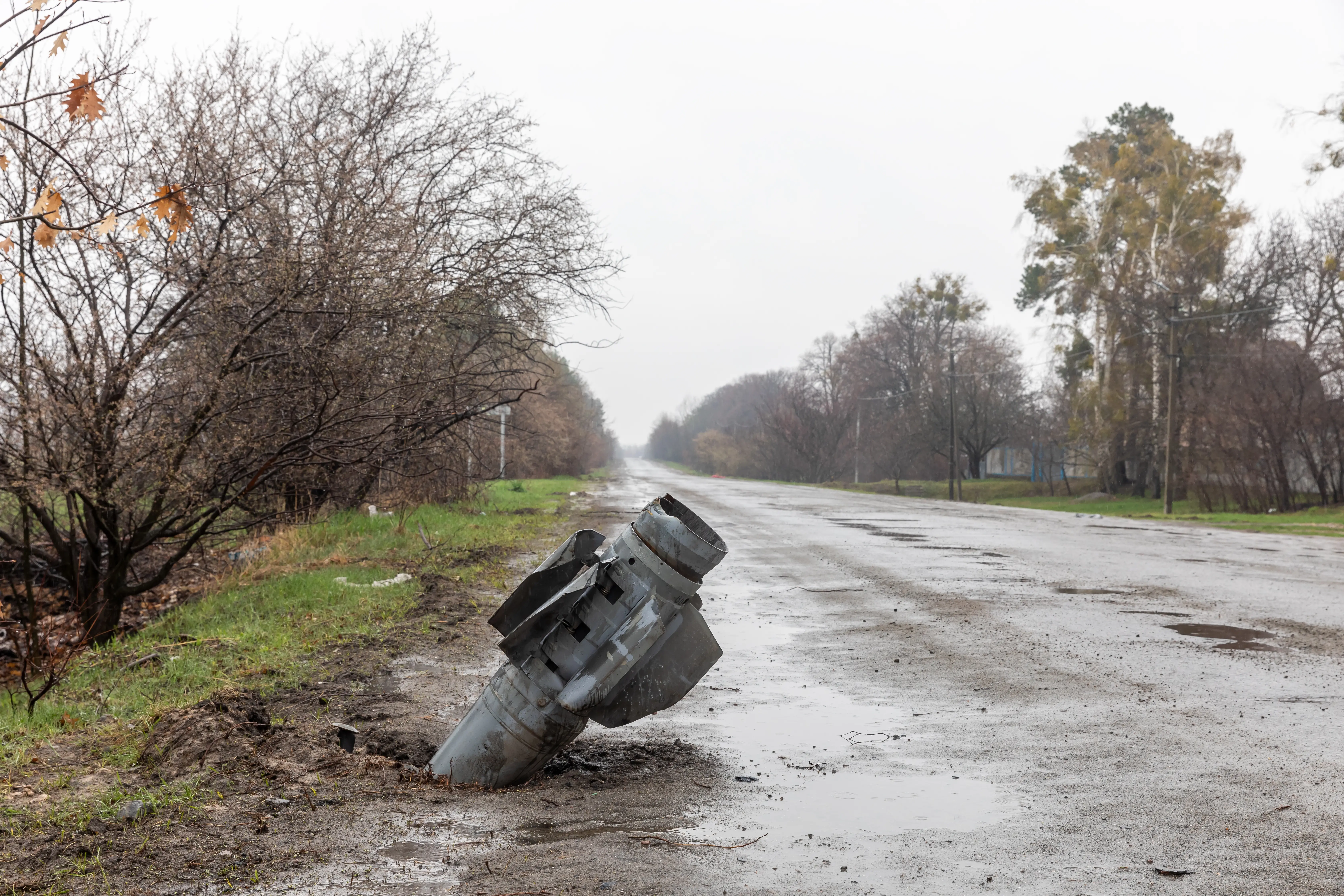
On March 31, Nizhyn district of Chernihiv region was liberated. Two of our BRDMs drove by. People, not realizing it was ours, also hid, because when Russian equipment was coming, people jumped over the fence, in various directions, because Russians were shooting right and left, at anyone who moved. There were times when Russians hung our flags on the tanks so that our people let them through. Therefore, when our troops came to liberate us, people did not believe it at first. Then they came out, welcomed the military, and thanked them.
The worst thing during the occupation was that there was nothing we could do, nothing we could change, there was no way for us to oppose. We just watch them come here, and they can do anything. We went to bed with our clothes on. My mother was practically unable to walk at 92 years old. She would just wake up, asking, "Is everybody alive? Is nobody killed?" They were shelling hard, everything was shaking, our fridge was bouncing, she would say: "I remember when the Germans went by, they didn't touch anybody. But these are hurting civilians."

